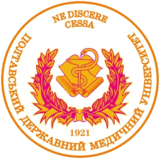Будь ласка, використовуйте цей ідентифікатор, щоб цитувати або посилатися на цей матеріал:
http://repository.pdmu.edu.ua/handle/123456789/20065| Назва: | Становлення емпатичного лікаря: сучасні погляди і виклики |
| Інші назви: | Establishing an empathic doctor: modern views and challenges |
| Автори: | Колісник, Інна Анатоліївна Панькевич, Артур Іванович Гоголь, Андрій Михайлович Kolisnyk, I. A. Pankevych, A. I. Hohol, A. M. |
| Дата публікації: | гру-2022 |
| Видавець: | Полтавський державний медичний університет |
| Бібліографічний опис: | Колісник І. А. Становлення емпатичного лікаря: сучасні погляди і виклики / І. А. Колісник, А. І. Панькевич, А. М. Гоголь // Український стоматологічний альманах. – 2022. – № 4. – С. 68–72. |
| Короткий огляд (реферат): | У процесі підготовки лікарів у ВНЗ особливого значення набуває розвиток якостей, що забезпечують особливості спілкування з пацієнтами таких, як людяність та емпатичність.
Емпатія є важливим компонентом у професійній діяльності лікарів усіх спеціальностей, тому розвиток і формування емпатії у студентів є необхідною професійною складовою майбутніх лікарів, умовою успішної діяльності лікаря як фахівця.
У статті описано поняття емпатії, її види та компоненти, розглянуто методи формування емпатійності та проаналізовано деякі із них. Акцентовано увагу на важливості розвитку емпатії у професійній діяльності лікарів усіх спеціальностей.
Залучення студентів до прийому пацієнтів, а саме: опитування, обстеження та лікування; обговорення клінічних випадків з розбором застосованих методів обстеження, плану лікування і прогнозу допомагає формувати та розвивати емпатійність, вчить спілкуванню з пацієнтами, що є досить важливими якостями лікаря. Medical reform, which is based on a human-centered approach, requires universities to train professionals who are able to learn quickly, adapt to new conditions, and be qualified and competitive specialists. Of particular importance is the development of qualities that ensure communication with patients, such as humanity and empathy. Empathy is an important component in the professional activity of doctors of all specialties, therefore the development and formation of empathy in students is a necessary professional component of future doctors, a condition for the successful activity of a doctor as a specialist. The article describes the concept of empathy, its types and components, considers the methods of forming empathy and analyzes some of them. Attention is focused on the importance of developing empathy in the professional activity of doctors of all specialties. Empathy in a clinical context is the doctor's ability to understand the emotions of patients, which can contribute to more thorough diagnosis and more careful treatment. Clinical empathy includes: 1 – the ability to understand the patient's condition, his feelings (emotions); 2 – the ability to communicate with the patient in order to understand his mental state, his emotions and check the accuracy of this understanding; 3 – the ability to act in a certain therapeutic way (taking into account the understanding of the patient's mental state). According to many researchers, empathy is a genetically determined property, strengthened or weakened by an individual's life experience, which depends on certain individual personality traits, but scientists have proven that empathy can be taught. According to the literature, a decrease in the level of empathy has been noted in the third year of study, when students begin clinical classes that require contact with a patient. The author associates this decline with the loss of the ideal image of a doctor and his professional role, with which young people begin their medical studies. The decrease in results after passing the first clinical classes can also be understood as a kind of protection mechanism in case of getting into various difficult and serious life-threatening situations. Other authors claim that there is no noticeable decrease in the level of empathy. Such ambiguous results arise as a result of the fact that researchers use various methods of its evaluation and once again emphasizes the relevance of these processes in modern clinical practice. Involvement of students in receiving patients, namely: survey, examination and treatment; discussion of clinical cases with analysis of applied examination methods, treatment plan and prognosis helps to form and develop empathy, teaches communication with patients, which are quite important qualities of a doctor. When developing empathy in students, one should not forget that during work the doctor encounters some stressful situations that are associated with the suffering of patients, and therefore, along with empathy, the doctor must possess stress resistance in order not to succumb to psychological deformation, emotional exhaustion and professional burnout, which in turn can negatively affect the quality of diagnosis and the effectiveness of patient treatment. It is worth noting that the achievements of modern medicine in the field of anesthesiological support, surgical intervention technologies, and patient care make it possible to harmonize this border between empathy and psychological deformation. Thus, during the professional training of doctors, teachers should pay attention not only to the acquisition of practical skills by students, but also to the development of empathy, the formation of stress resistance, training in interpersonal communication both with colleagues and patients, and the development of skills, related to empathy in a broad sense, should be one of the important tasks of medical education programs taking into account the biopsychosocial model of health. |
| Ключові слова: | емпатія психологічні тренінги людиноцентричний підхід психологія спілкування empathy psychological trainings human-centered approach psychology of communication |
| УДК: | 614.253.2:177.74 |
| ISSN: | 2409-0255 |
| URI: | http://repository.pdmu.edu.ua/handle/123456789/20065 |
| Розташовується у зібраннях: | Український стоматологічний альманах, 2022, № 4 Наукові праці. Кафедра пропедевтики хірургічної стоматології |
Файли цього матеріалу:
| Файл | Опис | Розмір | Формат | |
|---|---|---|---|---|
| Stanovlennia_empatychnogo_likaria.pdf | 336,74 kB | Adobe PDF | Переглянути/Відкрити |
Усі матеріали в архіві електронних ресурсів захищені авторським правом, всі права збережені.



